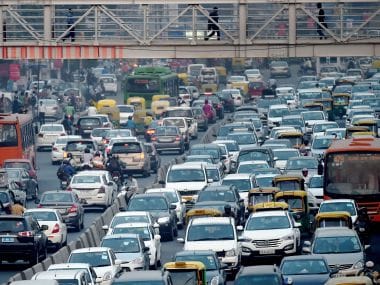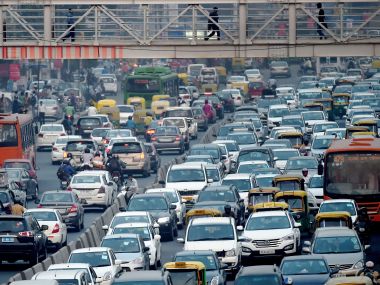Could declining vehicles sales not just in India but in many major world economies be the tipping point Tony Seba spoke of when he said that the technological skills, organisation and culture of the Industrial Revolution have run out of steam and are being disrupted and replaced by the technological skills, organisation and culture of the Information Technology (IT) era? Seba, Silicon Valley serial entrepreneur and instructor in entrepreneurship, disruption and clean energy at Stanford saw the coming of many of the disruptions years ago even as he said that the speed of change will multiply exponentially to knock out existing models. It is significant that auto sales in India have dropped 19 percent this year. But it cannot be a coincidence that a similar decline is evident in many other countries. In China, for instance, the drop is by 12 percent for the first six months of the year. In the US, car sales are down by 2.4 percent and analysts claim that for the first time since 2014 annual sales would be below 17 million. [caption id=“attachment_5619391” align=“alignleft” width=“380”]  Representational image. AFP.[/caption] It is possible that with the current economic scenario in India being what it is and the trade war between the US and China pushing economies to unchartered waters, many folks in these countries would have simply deferred buying a new car by a few months or years. However, those who cling to that as the reason for the erosion of sales might also have to live with the thought that the golden age of the motor car — in the form and shape as we know it — may well and truly be over. The motor car might have been the symbol of the Industrial Revolution but it is also a sitting duck for disruptive changes ushered in by the information revolution. It is little wonder, therefore, that the latest innovations into a motor car are all coming from the IT and energy giants like Apple, Tesla and Xiaomi. Seba in his numerous talks to wide-eyed, receptive audiences believes that there are tremendous synergy and convergence between these organisations and, a) Sensors/Internet of Things (IoT), b) 3D Printing, c) Artificial Intelligence/Machine Learning, d) Robotics, e) Electric Vehicles, f) Solar-powered Vehicles, g) Energy Storage, h) Mobile Internet and Cloud and i) Smart Devices. It is the linkage between these innovations and computers that will soon wipe out many of today’s professions and industries, he believes. Much of it will be hastened by the pricing of electric vehicles (EVs) which will fall rapidly and many times over to cost a mere Rs 7 lakh by 2025. “By 2030, all new market cars will be EVs,” he said. EVs, he prophesied, will be five times more energy-efficient, ten times cheaper and, interestingly, require zero maintenance. “A conventional car has 2,000 moving parts requiring constant and expensive maintenance. In contrast, an EV has just 18 moving parts. This has emboldened Tesla to give infinite miles warranty already!” he says. Thus, if maintenance and servicing are not required, many of the current dealerships which thrive or survive on car servicing will be history. Kodak had declared a profit of $1.4 billion in 2000. However, just a few years later, they had filed for bankruptcy protection. The advent of digital photography had knocked the stuffing out of Kodak flagship business—chemical film rolls. Motor cars, as we know it, may be going through a Kodak moment. The EVs look set to swamp the conventional cars. Car manufacturers are unhappy with the sops being given to the EVs and appealed the finance minister in their recent meeting to go easy with that. Closer home, a source with a skin in the game said that the government was working on a policy wherein EVs would be sold without battery. “The ownership of batteries would be with a service provider and could be leased from that company. These could be recharged — just like domestic gas cylinders are — at all petrol stations,” said the source.
Not surprisingly, the coming of the IT era has also had its say on lifestyles, attitudes and the ease of doing business. In fact, old business models are under tremendous strain to keep their bottom line out of the red. Online sales through Amazon and Flipkart have taken a heavy toll of the business models of shopping malls and brick and mortar stores. The stores now exist mostly for branding purposes.
In the hospitality industry, Swiggy, other food delivery startups, hotel room aggregators and others are seeing a terrific upsurge in business. Uber and Ola are clocking millions of rides every day, even if car sales are down to record lows. Likewise, many other businesses including medicine are seeing a sea change in approach. The British NHS, for instance, recently asked its citizens not to call them but instead turn to Amazon’s Alexa for medical help! But it is not just these technological advances and the way they are being positioned that are alone impacting businesses. The mindset and attitude of a younger generation too is playing out alongside and helping turn old models upside down. Medha, a young, new-age professional reflected this changed approach when she said she didn’t have to possess a luxurious property or a flashy car or an expensive gizmo to enjoy it. “Modern high-end flats cost upwards of a few crores of rupees. Instead of being tied down to it and bogged down by loans it makes sense to enjoy the flat by paying a decent rent. If you tire of the property or the city you can simply move elsewhere,” she says. It is obvious that possessing their own property or vehicle is not a priority for the next generation. It is probably the reason why many mid-range flats targeted at young professionals do not find the resonance of even the last decade. This rent-a-lifestyle experience whether it pertains to home, vehicle or gizmos, might seem bewildering to a generation that had slogged away to own a few possessions and save money in the bank. But the fact is that there is a major disruption at work and this is going to blow away professions, businesses, industries, attitudes and economies. To survive and subsequently thrive in it, we need to embrace the technological skills, organisation and culture of the IT era. Surely we live in interesting times!


)

)
)
)
)
)
)
)
)



